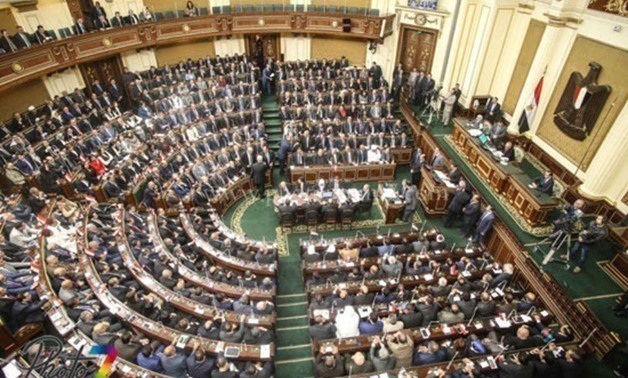
FILE - Egyptian Parliament
CAIRO - 17 July 2022: The House of Representatives approved a new law to bypass 65 percent of fines, delay interest and additional tax on arrears of taxes, customs and real estate tax, provided that the original tax is paid before the end of next August, according to Finance Minister Mohamed Maait.
“The door will be opened for filing tax disputes after the end of the Eid al-Adha holiday, and until the end of December of this year; this will help alleviate the burdens on the productive sectors in light of the negative repercussions of the war in Europe,” the Finance Minister said.
The Ministry of Finance allocated LE 1.1 billion in the budget of the current fiscal year to complete 13 industrial complexes in the governorates, in order to provide a stimulating infrastructure for owners of small, medium and micro enterprises, according to a statement from the Ministry of Finance.
“We will continue to support the industry in all possible ways to transform the current global crises into supportive development opportunities for the Egyptian economy, thus contributing to strengthening our production capabilities in various sectors, achieving food security, expanding the export base, and increasing the competitive strength of Egyptian products in international markets,” said the Minister of Finance, Mohamed Mait.
“During the past few years, many tax and customs incentives were approved to deepen domestic production, lay the foundations for industrial development, and deepen domestic manufacturing, especially in the fields of agriculture and industry, to achieve self-sufficiency in food and strategic commodities, and reduce the inflation bill imported from abroad,” he added.
“The recent amendments to the value-added tax law include exemptions that stimulate industry, including suspending the tax payment on machinery and equipment imported from abroad for use in industrial production for a period of one year from the date of their release and dropping them as soon as production begins,” according to the Minister of Finance.
The amendments to the Value Added Law included granting goods or services exported abroad by projects of economic zones of a special nature, or imported to them, with the same tax treatment for goods or services exported or imported by projects of regions, cities and duty-free shops abroad, subject to tax at a “zero” rate. This is to encourage investment in economic zones of a special nature by not charging the goods or services imported for these projects with value-added tax, according to the Minister of Finance.
The minister pointed out that the recent adjustments in the customs tariff also include reducing the “import tax” on more than 150 types of production inputs and requirements to stimulate the national industry.
The minister explained that the Cabinet agreed that the state’s public treasury would bear the value of the real estate tax due on real estate built for the industrial sectors, for a period of three years, starting from January 1, 2022, at an expected total cost of LE 3.3 billion. This contributes to supporting the state’s efforts aimed at localizing the industry and maintaining the wheel of local production, noting that LE 3 billion were allocated within huge financial incentives that were announced to deepen the auto industry in Egypt, starting from the new fiscal year, especially to encourage the transition to the use of gas and electricity.
“We continue to pay the late export burdens to the exporting companies, and the total amount that has been paid since the start of the initiatives to pay the overdue dues to exporters with the Export Development Fund in October 2019 so far, is about LE 35 billion,” Maait noted.
He added that the new phase of export support will be launched during the coming period, and LE 6 billion have been allocated in the new budget to support and develop exports, and LE 5 billion have been allocated to support reducing the price of electricity for the industrial sector.
Comments
Leave a Comment